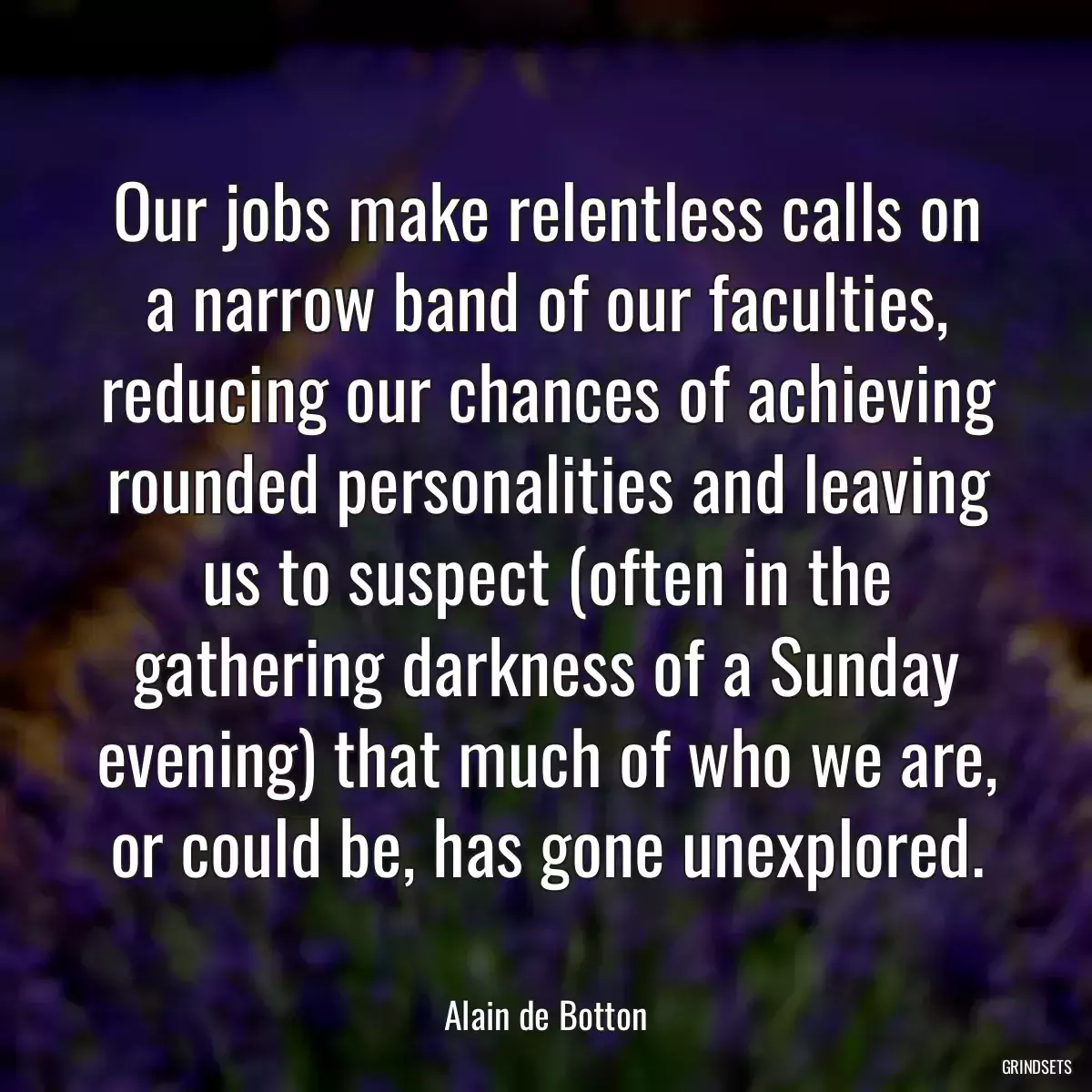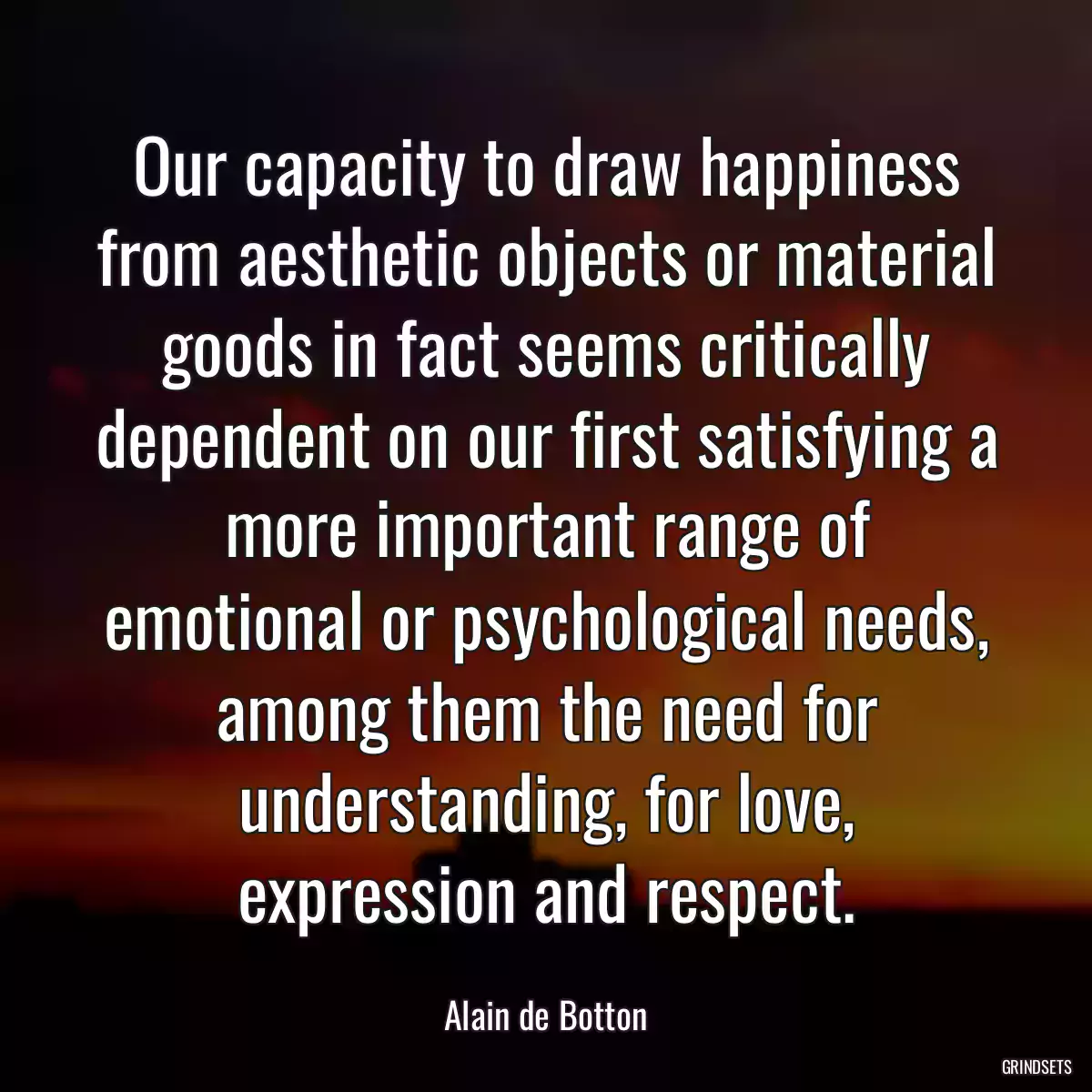
Quotes Alain de Botton - page 3
Find dozens of Alain de Botton with images to copy and share.

It seems, in fact, that the more advanced a society is, the greater will be its interest in ruined things, for it will see in them a redemptively sobering reminder of the fragility of its own achievements. Ruins pose a direct challenge to our concern with power and rank, with bustle and fame. They puncture the inflated folly of our exhaustive and frenetic pursuit of wealth.
Only as we mature does affection begin to depend on achievement.
We are tempted to believe that certain achievements and possessions will give us enduring satisfaction. We are invited to imagine ourselves scaling the steep cliff face of happiness in order to reach a wide, high plateau on which we will live out the rest of our lives; we are not reminded that soon after gaining the summit, we will be called down again into fresh lowlands of anxiety and desire.
You may also like
A virtuous, ordinary life, striving for wisdom but never far from folly, is achievement enough.
The pre-scientific age, whatever its deficiencies, had at least offered its members the peace of mind that follows from knowing all man-made achievements to be nothing next to the grandeur of the universe. We, more blessed in our gadgetry but less humble in our outlook, have been left... having no more compelling repository of veneration than our brilliant, precise, blinkered and morally troubling fellow human beings.
William James once made an acute point about the relationship between happiness and expectation. He argued that satisfaction with ourselves does not require us to succeed in every endeavour. We are not always humiliated by failing; we are humiliated only if we first invest our pride and sense of worth in a given achievement and then do not reach it.
Paying tax should be framed as a glorious civic duty worthy of gratitude - not a punishment for making money.
Perhaps the easiest people to fall in love with are those about whom we know nothing. Romances are never as pure as those we imagine during long train journeys, as we secretly contemplate a beautiful person who is gazing out of the window – a perfect love story interrupted only when the beloved looks back into the carriage and starts up a dull conversation about the excessive price of the on-board sandwiches with a neighbour or blows her nose aggressively into a handkerchief.

My writing always came out of a very personal place, out of an attempt to stay sane.
to design means forcing ourselves to unlearn what we believe we already know, patiently to take apart the mechanisms behind our reflexes and to acknowledge the mystery and stupefying complexity of everyday gestures like switching off a light of turning on a tap
It is in books, poems, paintings which often give us the confidence to take seriously feelings in ourselves that we might otherwise never have thought to acknowledge.
Literature deserves its prestige for one reason above all others - because it's a tool to help us live and die with a little bit more wisdom, goodness, and sanity.
It is in dialogue with pain that many beautiful things acquire their value. Acquaintance with grief turns out to be one of the more unusual prerequisites of architectural appreciation. We might, quite aside from all other requirements, need to be a little sad before buildings can properly touch us.
The bourgeois thinkers of the eighteenth century thus turned Aristotle's formula on its head: satisfactions which the Greek philosopher had identified with leisure were now transposed to the sphere of work, while tasks lacking in any financial reward were drained of all significance and left to the haphazard attentions of decadent dilettantes. It now seemed as impossible that one could be happy and unproductive as it had once seemed unlikely that one could work and be human.
Every time we feel satisfied with what we have, we can be counted as rich, however little we may actually possess.
Our minds are susceptible to the influence of external voices telling us what we require to be satisfied, voices that may drown out the faint sounds emitted by our souls and distract us from the careful, arduous task of accurately naming our priorities.
You may also like

If the behaviour of babies and small children is any guide, we emerge into the world with our tendencies to imbalance already well entrenched. In our playpens and high chairs, we are rarely far from displaying either hysterical happiness or savage disappointment, love or rage, mania or exhaustion--and, despite the growth of a more temperate exterior in adulthood, we seldom succeed in laying claim to lasting equilibrium, traversing our lives like stubbornly listing ships on choppy seas.